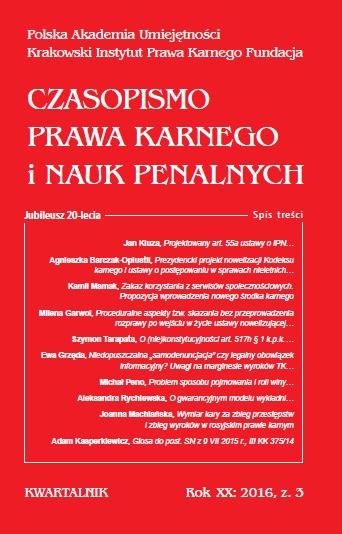Glosa do postanowienia Sądu Najwyższego z 9 lipca 2015 r., III KK 375/14
Commentary to the decision of the Supreme Court of 9 July 2015, III KK 375/14
Author(s): Adam KasperkiewiczSubject(s): Criminal Law
Published by: Polska Akademia Umiejętności / Krakowski Instytut Prawa Karnego Fundacja
Keywords: criminal proceedings; intertemporal criminal law; appeal cause; amendment of the Code of Criminal Procedure
Summary/Abstract: Sąd Najwyższy w komentowanym orzeczeniu rozważał zagadnienie intertemporalne, czy naruszenie przez sąd powszechny przed 1 lipca 2015 r. przepisów procedury karnej, stanowiące bezwzględną podstawę odwoławczą, rodzi obowiązek uwzględnienia tego uchybienia poza granicami zaskarżenia i zarzutów, jeżeli w dacie rozpoznania środka odwoławczego to uchybienie straciło charakter przyczyny odwoławczej określonej w art. 439 § 1 pkt 11 k.p.k. Rozstrzygnięcie problemu nastąpiło w oparciu o regułę kolizyjną mówiącą, że skutki uchybienia procesowego oceniać należy nie według ustawy obowiązującej w chwili jego zaistnienia, a obowiązującej w chwili rozstrzygania środka odwoławczego. Autor glosy poddaje częściowo krytycznej ocenie przyjęte przez Sąd Najwyższy rozwiązanie, wskazując na możliwe problemy interpretacyjne, jakie może rodzić w przyszłości jego zastosowanie, przedstawia własną interpretację przepisów wprowadzających zmiany do Kodeksu postępowania karnego uchwalone ustawą z dn. 27 września 2013 r., Dz. U. 2013, poz. 1247 oraz rozważa możliwość konwersji uchybienia o bezwzględnym charakterze odwoławczym we względną podstawę odwoławczą, które sąd rozpoznający środek zaskarżenia mógłby uwzględniać ex officio. The Supreme Court in the commented ruling considered an intertemporal issue, whether the infringement by the common court before 1 July 2015 of the provisions of criminal procedure, constituting an absolute ground of appeal, raises the obligation to include this failure outside the limits of the appeal and charges if on the date the appeal was found the defect lost its character the appeal referred to in art. 439 § 1 point 11 k.p.k. The resolution of the problem was based on the conflict rule that the effects of procedural defects should be assessed not according to the law in force at the time of its occurrence, and binding at the time of the adjudication of the appeal. The author of the voice critically appraises the solution adopted by the Supreme Court, indicating possible interpretation problems that may arise in the future of its application, presents his own interpretation of the provisions introducing amendments to the Code of Criminal Procedure adopted by the Act of September 27, 2013, Journal U. 2013, item 1247 and considers the possibility of converting a failure with an absolute appeal into a relative ground of appeal, which the court hearing the appeal could take into account ex officio.
Journal: Czasopismo Prawa Karnego i Nauk Penalnych
- Issue Year: 20/2016
- Issue No: 3
- Page Range: 205-213
- Page Count: 9
- Language: Polish

